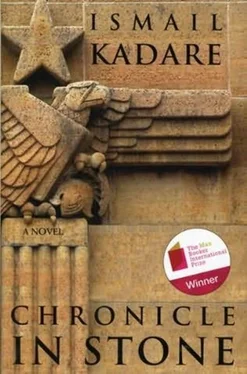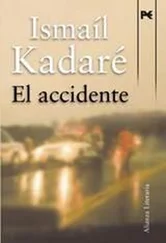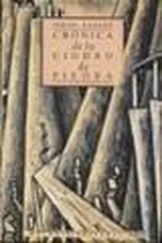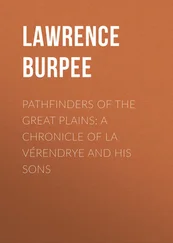Ismaíl Kadaré - Chronicle in Stone
Здесь есть возможность читать онлайн «Ismaíl Kadaré - Chronicle in Stone» весь текст электронной книги совершенно бесплатно (целиком полную версию без сокращений). В некоторых случаях можно слушать аудио, скачать через торрент в формате fb2 и присутствует краткое содержание. Жанр: Современная проза, на английском языке. Описание произведения, (предисловие) а так же отзывы посетителей доступны на портале библиотеки ЛибКат.
- Название:Chronicle in Stone
- Автор:
- Жанр:
- Год:неизвестен
- ISBN:нет данных
- Рейтинг книги:4 / 5. Голосов: 1
-
Избранное:Добавить в избранное
- Отзывы:
-
Ваша оценка:
- 80
- 1
- 2
- 3
- 4
- 5
Chronicle in Stone: краткое содержание, описание и аннотация
Предлагаем к чтению аннотацию, описание, краткое содержание или предисловие (зависит от того, что написал сам автор книги «Chronicle in Stone»). Если вы не нашли необходимую информацию о книге — напишите в комментариях, мы постараемся отыскать её.
Chronicle in Stone — читать онлайн бесплатно полную книгу (весь текст) целиком
Ниже представлен текст книги, разбитый по страницам. Система сохранения места последней прочитанной страницы, позволяет с удобством читать онлайн бесплатно книгу «Chronicle in Stone», без необходимости каждый раз заново искать на чём Вы остановились. Поставьте закладку, и сможете в любой момент перейти на страницу, на которой закончили чтение.
Интервал:
Закладка:
When I looked beyond the river, I saw that nothing was left. There was just an ordinary field in the autumn rain. The aerodrome had disappeared. My dream had ended.
“What’s wrong, my boy?” Grandmother asked when she found me with my head lying like a wrecked ship on the windowsill.
I didn’t answer.
Papa and Mamma also came in from the other room and asked me the same question. I wanted to tell them, but my mouth, lips and throat refused to obey. Instead of words, only a hoarse, inhuman sob came out. My parents frowned with fear.
“You’re crying for that… for that accursed thing whose name I can’t even bring myself to say,” Grandmother said, pointing towards the field, now splattered with puddles like so many wounds.
“You’re snivelling because of the aerodrome?” my father asked angrily. I nodded. He scowled.
“Poor little fool,” my mother said. “And I thought you were sick.”
They sat in the main room for a long while, torturing me with their silence. In vain I tried to stifle my sobs. My father’s face was glum. Mamma looked lost. Only Grandmother moved back and forth behind me, constantly muttering.
“Lord, what times have come upon us. Kids crying because of those flying things. Evil omens, evil omens.”
What was that longing that filled the rain-drenched days? The abandoned field lay below, riddled with small puddles. Sometimes I thought I could hear the sound of it. I would run to the window, to find nothing on the horizon but useless clouds.
Maybe they had shot it down and now it languished on a hillside with its broken wings folded underneath. Once I had seen the remains of a long-limbed bird in a field. Its delicate bones had been washed clean by the rain. Part of it was spattered with mud.
Where could it be?
Over the field, once bound to the sky, a few wisps of fog now drifted.
One day they brought the cows back, and they moved slowly with their silent brown spots, seeking the last bits of grass along the edges of the concrete runway. For the first time I hated them.
The city, weary and sullen, had changed hands several times. The Italians and Greeks alternated. Flags and currencies were changed, amid general indifference. Nothing else.
FRAGMENT OF A CHRONICLE
changing of currencies. The Albanian lek and Italian lira will no longer be accepted. Henceforth the only legal tender will be the Greek drachma. The time limit for the changeover is one week. Yesterday the prison was emptied. The inmates, after thanking the Greek authorities, went their separate ways. I order the cessation of the blackout, effective today. I declare a state of siege, and a curfew from 1800 to 0600 hours. Commander of the city garrison: Katantzakis. Births. Marriages. Deaths. D. Kasoruho and I. Grapshi are happy to
FRAGMENT OF A CHRONICLE
der: restoration of the blackout for the entire city and cancellation of the state of siege. I order the re-opening of the prison. All former inmates are hereby called upon to return to serve out their sentences. Commander of the city garrison: Bruno Arcivocale. Currency must be converted quickly. The Greek drachma is no longer acceptable. The Albanian lek and the Italian lira shall be the sole legal tender. List of those killed in yesterday’s bombing: B. Dobi, L. Maksuti, S.
NINE
The last Italians left during the first week of November, four days after the evacuation of the aerodrome. For forty hours there was no government in the city. The Greeks arrived at two in the morning. They stayed for about seventy hours, and hardly anyone even saw them. All shutters stayed closed. No one went out in the street. The Greeks themselves seemed to move only at night. At ten in the morning on Thursday the Italians came back, marching in under freezing rain. They stayed only thirty hours. Six hours later the Greeks were back. The same thing happened all over again in the second week of November. The Italians came back. This time they stayed about sixty hours. The Greeks rushed back in as soon as the Italians had gone. They spent all day Friday and Friday night in the city, but when dawn broke on Saturday, the city awoke to find itself completely deserted. Everyone had gone. Who knows why the Italians didn’t come back? Or the Greeks? Saturday and Sunday went by. On Monday morning footsteps echoed in the street where none had been heard for several days. On either side of the street women opened their shutters gingerly and looked out. It was Llukan the Jailbird, with his old brown blanket slung over his right shoulder. In his kerchief he was carrying bread and cheese, and was apparently on his way home.
“Llukan!” Bido Sherifi’s wife called from a window.
“I was up there,” said Llukan, pointing to the prison. “I went there to report, but guess what? The prison is closed.”
There was almost a touch of sadness in his voice. The frequent changes of rulers had made mincemeat of his sentence, and this put him out of sorts.
“No more Greeks or Italians, you mean?”
“Greeks, Italians, it makes no difference to me,” Llukan answered in exasperation. “All I know is the prison isn’t working. The doors are wide open. Not a soul around. It’s enough to break your heart.”
Someone asked him another question, but he didn’t answer and just went on cursing.
“Lousy times, lousy country! Can’t even keep a lousy prison running. Am I supposed to waste time every day, climbing up to the citadel and coming back down for nothing? Days go by and I can’t serve my damn sentence. All my plans are screwed up. Son of a bitch good for nothing Italy! Damn, when I think about what a friend told me about Scandinavian prisons! Now that’s what you call prisons. You go in and out on schedule, by the book. Fixed sentences and good records. The gates don’t swing open and shut all the time like the doors of a whorehouse.”
One by one the women closed their shutters as Llukan got more and more obscene. Only Aqif Kashahu’s mother, who was deaf, stayed at her window and answered what she thought she was hearing.
“How true, dear fellow, how true. You’ve every right to be angry, my boy. Never had a lucky day in your life, poor thing, rotting in prison all the time. Governments come and go, and you’re always inside.”
Llukan the Jailbird walked on and the street was empty again. Nazo’s big cat leaped across the cobblestones. Kako Pino’s new cat, who had climbed up on the porch, sat and watched him. Around noon a stray dog passed by. All afternoon there was not a soul to be seen, apart from a solitary chicken.
The next morning, as Llukan the Jailbird came swearing down from the prison again with his blanket over his shoulder and kerchief-wrapped bread in hand, everyone finally got the idea that a period of no government had begun.
The first doors were opened just a slit. Little by little, the street came back to life. Some people ventured into the city centre. The Addis Ababa Café re-opened. The wind scattered newspaper shreds in the square. Empty tins lay here and there. The town hall looked sullen, with all its doors and windows boarded up. People strolled around, eyeing empty crates with Latin or Greek letters painted in black on their boards. The pedestal of the city’s only monument had been plastered with notices issued by the Italian and Greek garrison commanders. The posters were all torn. Someone was carefully gathering up random pieces: “XAQIS”, “KAT”, “Q”, “NX”. His collar was turned up, and he kept shaking his head, perhaps because he couldn’t find all the words. The cold wind blew the shreds from his hands.
These posters, turned to scraps by wind and rain, were all that remained of the turmoil of recent days. The city had been left without a government. In quick succession it had lost the planes, the anti-aircraft guns, the siren, the brothel, the searchlight and the nuns.
Читать дальшеИнтервал:
Закладка:
Похожие книги на «Chronicle in Stone»
Представляем Вашему вниманию похожие книги на «Chronicle in Stone» списком для выбора. Мы отобрали схожую по названию и смыслу литературу в надежде предоставить читателям больше вариантов отыскать новые, интересные, ещё непрочитанные произведения.
Обсуждение, отзывы о книге «Chronicle in Stone» и просто собственные мнения читателей. Оставьте ваши комментарии, напишите, что Вы думаете о произведении, его смысле или главных героях. Укажите что конкретно понравилось, а что нет, и почему Вы так считаете.












